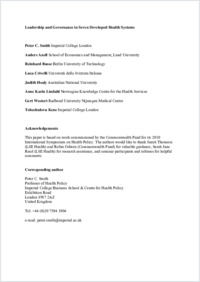Leadership and governance in seven developed health systems
- Smith, Peter C. Imperial College, London, United Kingdom
- Anell, Anders School of Economics and Management, Lund University, Sweden
- Busse, Reinhard Berlin University of Technology, Germany
- Crivelli, Luca Istituto di economia politica (IdEP), Facoltà di scienze economiche, Università della Svizzera italiana, Svizzera
- Healy, Judith Australian National University, Australia
- Lindahl, Anne Karin Norwegian Knowledge Centre for the Health Services, Norway
- Westert, Gert Radboud University Nijmegen Medical Centre, The Netherlands
- Kene, Tobechukwu Imperial College, London, United Kingdom
-
2012
Published in:
- Health policy. - Elsevier. - 2012, vol. 106, no. 1, p. 37-49
English
This paper explores leadership and governance arrangements in seven developed health systems: Australia, England, Germany, the Netherlands, Norway, Sweden and Switzerland. It presents a cybernetic model of leadership and governance comprising three fundamental functions: priority setting, performance monitoring and accountability arrangements. The paper uses a structured survey to examine critically current arrangements in the seven countries. Approaches to leadership and governance vary substantially, and have to date been developed piecemeal and somewhat arbitrarily. Although there seems to be reasonable consensus on broad goals of the health system there is variation in approaches to setting priorities. Cost-effectiveness analysis is in widespread use as a basis for operational priority setting, but rarely plays a central role. Performance monitoring may be the domain where there is most convergence of thinking, although countries are at different stages of development. The third domain of accountability is where the greatest variation occurs, and where there is greatest uncertainty about the optimal approach. We conclude that a judicious mix of accountability mechanisms is likely to be appropriate in most settings, including market mechanisms, electoral processes, direct financial incentives, and professional oversight and control. The mechanisms should be aligned with the priority setting and monitoring processes.
- Language
-
- English
- Classification
- Medicine
- License
-
License undefined
- Open access status
- green
- Identifiers
-
- RERO DOC 203023
- DOI 10.1016/j.healthpol.2011.12.009
- ARK ark:/12658/srd1318584
- Persistent URL
- https://n2t.net/ark:/12658/srd1318584
Statistics
Document views: 172
File downloads:
- Texte intégral: 1278
